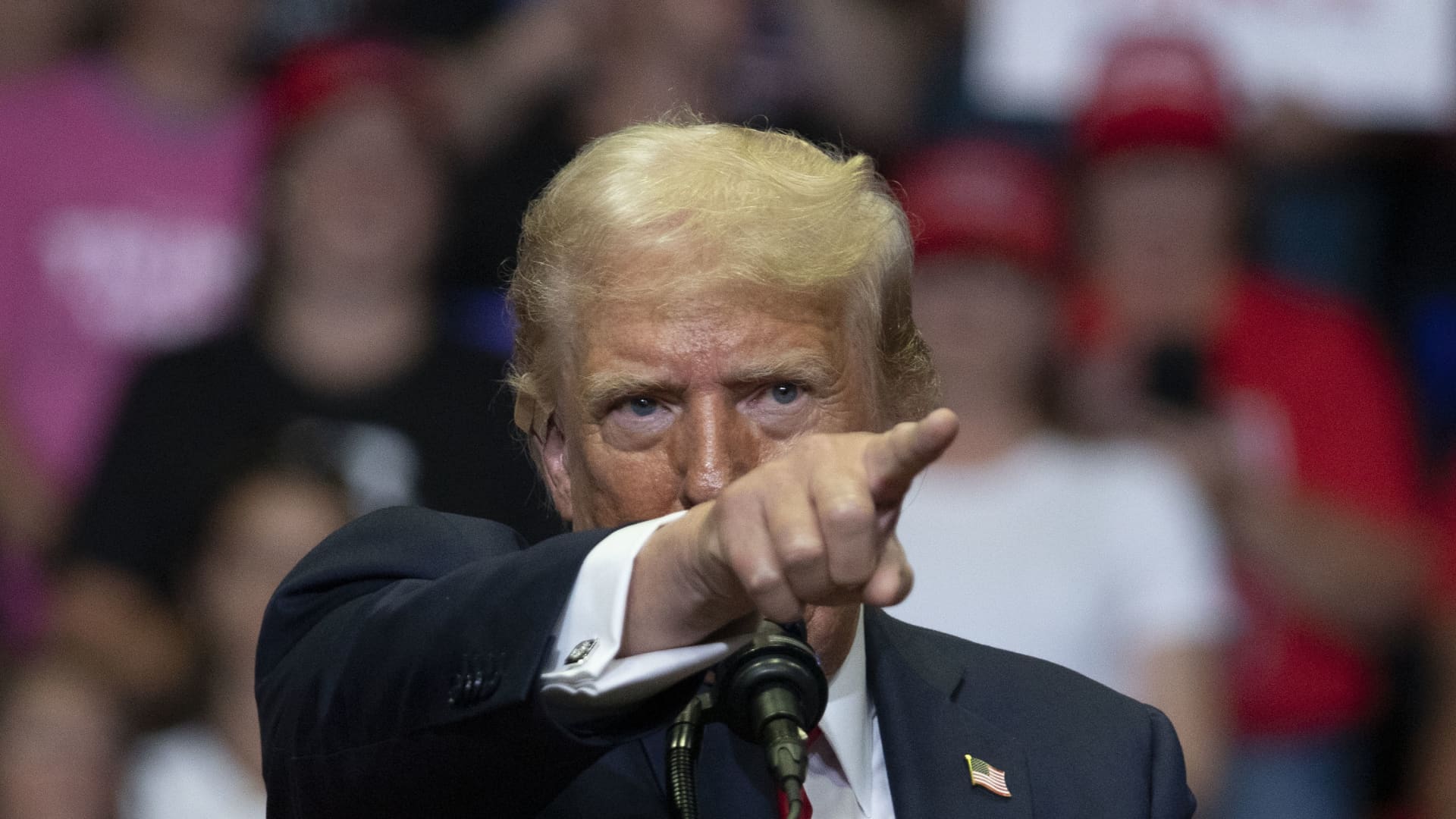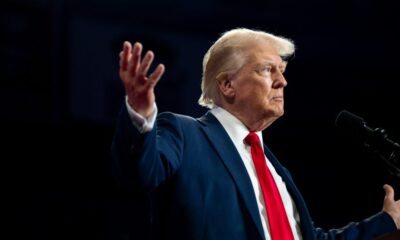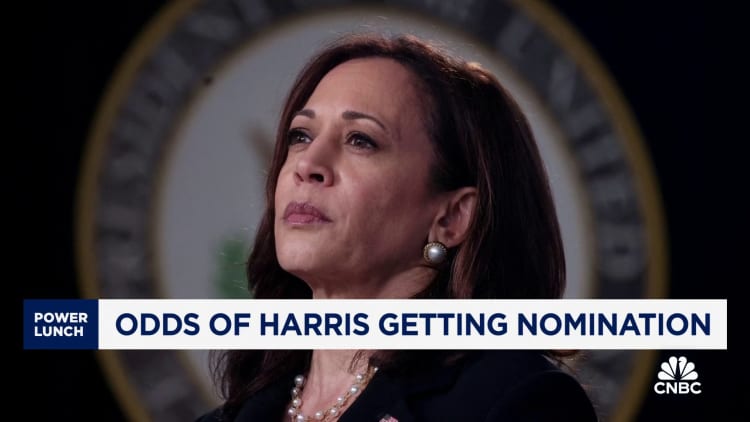News
Coinbase (COIN), Ripple (XRP) Notch Wins in Expensive Quest to Sway U.S. Politics – Without Mentioning Crypto

In politics, money talks, but the donors and organizers behind crypto’s massive U.S. campaign fund don’t.
The digital assets industry has amassed a juggernaut of campaign finance, a $169 million fund that’s capable of steering many contests this year and could decide the makeup of next year’s Congress. It’s already scored more than 20 victories, including high-profile elections in California and, just this week, New York. Crypto’s political operation has been using tactics it tested successfully in the congressional races two years ago, but this time, there’s a lot more money – enough to rival the top politically active industries and even the major parties’ own war chests. And those in charge of how it’s spent don’t want to discuss how they got here.
Representatives of the Fairshake political action committee that wields the bulk of the money have declined to answer questions about the PAC’s management, coordination and decision-making, and its main backers – including Coinbase Inc., Ripple and Andreessen Horowitz (a16z) – are similarly reticent, despite repeated attempts by CoinDesk over a months-long period to ask who is in charge and how choices are made with funds pooled by industry leaders.
CoinDesk analyzed the federal campaign-donor disclosures of more than two dozen prominent business leaders and leading companies to paint a picture of an operation that’s rapidly (and cooperatively) amplifying its approach to political influence. The vast bulk of money is shepherded through a set of coordinated PACs under the umbrella of Fairshake. That PAC is affiliated with a matched set of underling committees: Protect Progress, for supporting Democrats, and Defend American Jobs, the Republican outlet. The industry has also used a dark-money group, the Cedar Innovation Foundation, which in one initiative pushed the crypto cause in the pivotal-but-delicate battleground of Ohio.
The PACs have flooded targeted primary elections with influxes of money that in some cases vastly outpaced the organic fundraising by the candidates, but so-called super PACs like Fairshake don’t give directly to campaigns. That would be illegal. Instead, they buy ads for or against candidates, which they can do at an unlimited level. While one primary candidate in a race may be relying entirely on rounding up individual donations, which are capped at $3,300 per election, her opponent may get the boon of this super PAC that splashes out millions.
Crypto benefactors offer an explanation for the massive campaign spending: Tens of millions of U.S. voters who want the government to embrace and write tailored rules for digital assets haven’t been heard, they say.
“It became obvious to us that they had almost no voice in the political process and that there was this huge disconnect between policymakers and this gigantic cross-section of the American public,” said Faryar Shirzad, chief policy officer at Coinbase, in an interview with CoinDesk.
“We’re trying to de-politicize crypto,” said Faryar, who migrated to the industry from Wall Street titan Goldman Sachs Group Inc. “Our broader policy and political efforts are designed to allow us to have discussion on the merits.”
When contacted by CoinDesk, Coinbase invited further questions about its political involvement before declining to get into the nuts and bolts of how decisions are being made with the nearly $50 million the company donated. Ripple and a16z Crypto were asked similar questions that sought to understand how the PACs were set up, who is in charge of them and how the wishes of donors have been shared with those managing the giving, and they declined to answer.
Public company Coinbase did disclose in a filing to the U.S. Securities and Exchange Commission that “in December 2023, we together with a number of other crypto and blockchain market participants supported the launch of the Fairshake Political Action Committee to support political candidates in the 2024 U.S. presidential election who support crypto and blockchain innovation and responsible regulation.” However, a Fairshake spokesman told CoinDesk the PACs aren’t planning to weigh in on presidential candidates, despite recent news from some of the individual leaders who have loudly thrown in with former President Donald Trump.
While the Coinbase statement suggests coordination among donors, it’s unclear how the companies – sometimes rivals – came together, though most of the companies or businesses they’ve invested in have faced enforcement disputes with federal regulators. Their cooperation is seemingly continuing, with a recent follow-up round of matching contributions from the top three companies for $25 million each.
One of the emerging stars in U.S. progressive politics, Rep. Katie Porter (D-Calif.), was setting a course to become another Sen. Elizabeth Warren (D-Mass.), the former presidential candidate and outsized presence in Democratic politics. In Porter’s California, the 50-year-old lawmaker had a reasonable shot at an open Senate seat this year.
But the cryptocurrency industry’s political operation couldn’t stomach another high-profile senator standing in the way in Washington, so it devoted more than $10 million to sour her base of young voters there during the California primary.
Her high-profile Senate campaign in California had raised a little more than $30 million from direct donors and about another $500,000 from outside PAC support, so, thanks to this single industry, about a third of that was directly countered.
The campaign to derail Porter flew banners over Hollywood and drove vans around featuring barbed commentary to support accusations that she was misleading voters about taking corporate support for her campaign – a claim her campaign refuted, countering that it was “billionaires and corporate special interests using misinformation to rig our elections.”
Under the well-funded assault, Porter fell behind frontrunner Rep. Adam Schiff (D-Calif.) – who raised a similar amount but had no opposition spending – and top Republican candidate Steve Garvey, a former Major League Baseball star. She was eliminated in the primary, blocking her pathway to the Senate and bumping her entirely from Congress (since she isn’t running to keep her House seat).
A consistent strategy of Fairshake is to focus on districts that lean strongly toward one party and to support crypto-friendly candidates in those primary elections, because the winners are also likely to take the general election. If that seems a familiar gambit to elevate crypto candidates, it may be because it was the same one used by GMI PAC Inc., a leading industry PAC in 2022, which counted convicted fraudster Sam Bankman-Fried, the former FTX CEO, as one of its top backers. GMI’s strategist then, Michael Carcaise, is in a similar role now at Fairshake.
More recently, the crypto PACs set sights on a congressional district in Westchester County and part of the Bronx in New York. Its incumbent Democrat, Rep. Jamaal Bowman, opposed two recent congressional votes that became instant litmus tests for the crypto industry’s view of sitting lawmakers: whether they supported the House’s Financial Innovation and Technology for the 21st Century Act (FIT21) or Congress’ effort to overturn the SEC’s crypto account policy. (The Republican-backed bill got “yes” votes from one-third of House Democrats – a surprising show of bipartisanship.)
The industry aimed a $2.1 million blowtorch of negative ads opposing Bowman, opening with, “What happened to decency? It’s gone in Jamaal Bowman’s New York.”
Progressive House firebrand Rep. Alexandria Ocasio-Cortez (D-N.Y.) called it “disgusting and abnormal” for so much outside money to be dumped into the race in an effort to unseat Bowman – spending which went well beyond Fairshake to include other PACs.
To put it in perspective, Bowman’s own fundraising had brought in about $4.3 million, according to Federal Election Commission records. In other words, when it came to campaign advertising in that district, the vast majority of messaging was paid for by Fairshake and other outside super PACs, not any of the candidates. And on Tuesday, incumbent Bowman was soundly defeated.
Neither Bowman’s campaign nor that of the Democratic primary winner, George Latimer, responded to earlier requests for comment on crypto’s role.
In a less high-profile primary battle in Alabama earlier this year, Shomari Figures’ campaign managed to outpace several other Democratic contenders, though he’d raised a similar amount to his closest rival – both taking in less than $500,000 in direct donations. One difference: Fairshake devoted $2.4 million to advertising on Figures’ behalf and spent more than $200,000 to oppose one of his fellow Democrats, according to election records.
“It’s becoming increasingly common for super PACs to spend more than the candidates that they’re supporting,” said Sarah Bryner, director of research and strategy at OpenSecrets, in an interview with CoinDesk.
Figures, a veteran of several government roles in Washington, once worked for Sen. Sherrod Brown (D-Ohio), who has so far been an impediment to crypto legislation progress as the chair of the Senate Banking Committee. But Figures indicated on his campaign website that he’d “embrace the new landscape around digital assets, like cryptocurrency, to stimulate innovation and technological advancement.” The PACs are making big-money bets on such statements by untested politicians.
“It’s really turning into one of the biggest forces of money in politics in this cycle,” said Jordan Libowitz, vice president for communications at the Center for Responsibility and Ethics in Washington, who equated Fairshake’s approach as a “money-in-politics speed run.”
The amount of money still on hand – which was $109 million as of May 31, according to the PACs – keeps them “on everyone’s radar,” Libowitz said.
Crypto’s political arms clearly aren’t shy about spending a lot, but this isn’t the industry’s first time under the campaign-finance spotlight. In the congressional races two years ago, the sector nearly reached $100 million, all said. Some $74 million, though, was tied to the now-imprisoned Bankman-Fried and his cohorts at the defunct FTX crypto exchange.
When the dust settled on those previous elections, one in three members of Congress had taken FTX-tied money. And in the end, that money became a target for clawback in the company’s multi-billion-dollar bankruptcy.
A handful of businesses and individuals stand out as crypto’s leading donors this time, including Marc Andreessen and Ben Horowitz, the well-known digital assets investors behind a16z; Brian Armstrong, the CEO of Coinbase; and Tyler and Cameron Winklevoss, the twins behind the Gemini platform. They’ve all given so much money that their names have begun appearing among top political donors nationally.
A ranking maintained at OpenSecrets.org had Andreessen and Horowitz breaking into the top 10 this year, with their most recent commitments likely moving them even higher on that list. That rarified air was visited in 2022 by Bankman-Fried, who was once ranked as the fourth most prolific donor in the country.
While the PACs have stayed out of the biggest political show of 2024, several crypto dignitaries have revealed their personal preferences in the race for the White House.
The Winklevoss brothers made news last week by saying they’d each commit $1 million to back Trump (though some of that was later refunded due to the pair exceeding campaign contribution limits). Before that, the Gemini executives – who have so far given matching sets of political donations in this cycle – had backed most of the serious contenders who tried to seize the Republican nomination away from Trump: Vivek Ramaswamy, Nikki Haley, Sen. Tim Scott and Florida Gov. Ron DeSantis. They each personally gave $2.5 million to Fairshake also, putting them among its top individual donors, but they declined to answer questions sent to a Gemini spokesperson.
Perianne Boring, the head of the Digital Chamber – a U.S. lobbying arm of the industry – had personally supported the campaign of Gov. DeSantis last year before backing crypto fan Robert Kennedy Jr. this year in his independent bid for the White House. Kristin Smith, who runs the Blockchain Association in Washington, had put her money behind Ramaswamy, who had – for a time – been the candidate with the most aggressive stance on the benefits of cryptocurrencies.
With Trump making a dramatic shift as a digital assets booster, Messari founder and CEO Ryan Selkis has been a very vocal supporter of the former president as the best bet for the industry, though Selkis has sent money to Trump, Ramaswamy and U.S. Rep. Dean Phillips, a Democrat who challenged President Joe Biden.
Others who cut some of the biggest personal checks for campaign support in this election are a trio of million-dollar donors to Fairshake, including Coinbase’s Armstrong, who has also given more than $100,000 to individual lawmakers – a list of Republicans in the Senate and a more even mix of Democrats and Republicans in the House. The others are venture capitalist and Union Square Ventures co-founder Fred Wilson, and Phil Potter, a former Bitfinex and Tether executive.
Still, the bulk of the digital assets sector’s political juice is coming from the biggest businesses. Coinbase, Ripple and a16z are leading the pack, though Jump Crypto (which is reportedly under CFTC investigation) recently chimed in with another $10 million (for $15 million total). USDC stablecoin issuer Circle Internet Financial and Payward Inc. (which is facing an SEC lawsuit) have also given significant amounts.
Though many of the insiders leaned toward supporting Republicans, the crypto PACs have carefully distributed money across both parties.
“At Ripple, we believe the future of the crypto industry is not really a partisan issue at all,” Ripple CEO Brad Garlinghouse said in a statement to CoinDesk. “Many Republicans and Democrats alike are already supporting a pro-innovation and pro-compliance posture that could allow the U.S. to regain a position of leadership in this critical segment of technology. That same leadership in the development of the internet allowed massive job creation and geo-political benefits – and our elected officials have an opportunity to do that again here.”
It’s unusual for a super PAC to give to both parties, according to Bryner, so that bolsters the industry’s non-partisan claim.
As for public engagement, Garlinghouse’s and other companies have mostly limited themselves to press releases, curated blog posts and general public statements.
“We will continue to make contributions to candidates who believe in productive uses of blockchain technology,” a spokesman of a16z offered as one example.
None of the companies have raised their hands to disclose whether they’re supporting the Cedar Innovation Foundation, the dark-money operation backed by crypto interests. Though one common denominator for all of the PACs and Cedar is a shared spokesman, Josh Vlasto.
The latest ads going after Bowman in New York illustrate another noteworthy component of crypto’s political engagement: The industry-funded messages don’t usually mention digital assets.
As demonstrated with the generic names of PACs such as Protect Progress and Defend American Jobs, crypto’s campaign operations make some effort to avoid being obviously connected to crypto. Most of the time, the ads like those targeting Bowman or supporting others don’t even mention their positions on cryptocurrencies, even if that’s the purpose behind the spending. The ads are instead attempts to wound or bolster their core political credentials.
One exception was an effort to get crypto enthusiasts in California to rise up against Porter, because their demographic tended to overlap with her base in the state.
Otherwise, the spending represents unfiltered political expediency, trying to get as many members of Congress as possible on the pro side of crypto votes by expending colossal amounts of money to pay for whatever messages will be most effective in getting wins.
Business interests have long tried to steer U.S. elections, especially after the Citizens United decision from the U.S. Supreme Court opened a highway of “independent expenditures” by super PACs.
“Now they’re doing it much more in the open,” Libowitz said. “A company is not writing a $25 million check out of the goodness of its heart,” he said, but because that firm expects it to help business.
Industry insiders are already seeing the powerful campaign-finance potential heightening how seriously their issues are being taken on Capitol Hill in this current session, long before the general election. And this year’s presidential contest has suddenly latched onto digital assets, too – literally. Trump pivoted recently from his past suspicion of cryptocurrency to a new embrace – echoing the crypto-friendly positions of some of the Republican candidates who had competed with him earlier in the race, and opening his campaign to cryptocurrency donations. While Fairshake has so far indicated it’s staying out of the Biden-Trump clash, that contest has a heavy potential effect on crypto’s U.S. destiny.
“Our focus continues to be on supporting candidates on both sides of the aisle and in both chambers who will stop playing politics and pass clear and responsible rules of the road which will protect American consumers, spur American innovation and grow American jobs,” Vlasto said in a statement.
As Ripple’s Garlinghouse put it: “Those that stand in the way of that will certainly be on the wrong side of history.”
The famously fast-tempo industry has slowly learned the lesson of the long game in Washington, and Vlasto said this campaign-finance effort is already preparing to influence races beyond November.
“We are employing a sustainable strategy and have built an effective operation that is well-positioned for the long term,” he said. “We will have the resources to affect races in 2024 and beyond.”
News
Is Shiba Inu a good buy while trading below $0.01?

Advances in artificial intelligence (AI) technology and innovative new drugs in the weight loss market were major contributors to stock market gains for much of the past year.
While investors have reaped generous returns from owning mega-cap technology and some pharmaceutical stocks, it’s human nature to wonder what else is out there and where additional value can be found.
Investment alternatives how cryptocurrencies have gained massive popularity over the past decade or so — and one of the most curious cryptocurrencies, Shiba Inu (SHIB 2.08%), it may seem very tempting, as trades below a penny.
Let’s take a look at the Shiba Inu and find out if it’s a good buy right now.
What is Shiba Inu?
The first thing to know about cryptocurrency in general is that not all cryptocurrencies are created equal. Some of the most popular cryptocurrencies out there include Bitcoin, EthereumIt is Solana. While each of them still carries some degree of speculation, all of these currencies have achieved some form of real-world application.
For example, Bitcoin is now accepted as a means of payment in some online stores and retail establishments. In addition, many projects that revolve around non-fungible tokens (NFT) tend to rely on Ethereum, Solana, and other major cryptocurrencies.
Shiba Inuin turn, is in a totally different category.
That is, Shiba Inu is often affiliated with Dogecoin. Although Dogecoin has experienced some fleeting volatility in the past — largely thanks to some irreverent support from high-level personalitiesincluding Mark Cuban and Elon Musk — cryptocurrency is largely seen as a joke.
In investing, non-serious investments tend to fall under the category of a meme. Shiba Inu is no exception here. With little to no real-world utility, Shiba Inu is widely seen as a meme coin.
Image source: Getty Images.
Should you buy Shiba Inu while it is selling for less than a penny?
Shiba Inu’s price dynamics closely follow the rules of supply and demand. At the moment, Shiba Inu has a total supply of 589 trillion tokens, and the coin is trading at just $0.000017.
With such an abundance of Shiba Inu coins available, the asset is anything but scarce. In other words, pretty much anyone can buy Shiba Inu if they want to. For this reason alone, it doesn’t have much appeal for investors looking to spot a profitable opportunity.
Given the lack of demand, it is not surprising to see that the Shiba Inu is trading for less than a penny. Unless a large number of institutional investors invested billions of dollars in purchasing Shiba Inu, I can’t imagine a world where the currency starts to gain traction in the market.
Since cryptocurrency is still considered a speculative investment, I consider it highly unlikely that large fund managers will buy Shiba Inu en masse.
Instead, I think Shiba Inu will continue to be the favorite among a small group of retail investors — specifically, inexperienced traders who follow the advice of online influencers or fake financial gurus.
If you are looking for exposure to cryptocurrency but can’t decide which coin to buy, there are many cryptocurrency stocks that could serve as a decent proxy. Companies like Coinbase, Robinhoodand even Microstrategy each offers investors some exposure to the cryptocurrency landscape, but with some degree of isolated risk.
So while Shiba Inu may seem cheap, there are many reasons why the coin’s value remains depressed. I think investors are better off moving on from Shiba Inu and considering more established cryptos or individual stocks operating in the crypto space.
Adam Spatacco has positions in Coinbase Global. The Motley Fool has positions in and recommends Bitcoin, Coinbase Global, Ethereum, and Solana. The Motley Fool has a disclosure policy.
News
AI meme Raboo and crypto newbie ZRO

Disclosure: This article does not constitute investment advice. The content and materials presented on this page are for educational purposes only.
Raboo and ZRO are outperforming Dogecoin with unique features and growing investor interest.
In the evolving cryptocurrency market, Raboo (RABT) and ZRO are emerging as standouts, gaining significant traction among investors. These new coins are not only on the rise but are also outperforming the established meme coin, Dogecoin (DOGE).
Raboo’s unique integration of AI into meme culture and ZRO’s fresh approach are attracting a growing community of enthusiasts. This article delves deeper into the unique features of Raboo and ZRO, exploring how they are shaping the future of the crypto landscape and why they may offer compelling investment opportunities. Read on to discover the potential of these rising stars.
DOGE: The veteran memecoin
DOGE has a market cap of over $19 billion as of July 2024 and in this circulation, there is a supply of 145 billion DOGE. The price of the coin jumped 6% in the last 7 daysechoing the trend — increased investor interest and market recovery.
Although Dogecoin was initially created as a joke, it has still held up quite well, probably due to the fact that it has had a huge community since its inception and periodic endorsements from important people like Elon Musk, thus keeping this cryptocurrency relevant and moving.
Dogecoin’s current rise could also be driven by events such as increased institutional adoption and favorable developments around the Dogecoin Foundation. These events are generating more interest, with a halving likely in 2025. Analysts project that Dogecoin will trade within the $0.15 and $0.25 range in the near future.
ZRO: A Rising Star in the Crypto Universe
ZRO is the native token of LayerZero, a robust and promising newcomer to the cryptocurrency market, which has been attracting attention recently for its intrinsic value and recent market performance. LayerZero is a cross-chain interoperability protocol that allows blockchains to communicate seamlessly with each other, literally being a “blockchain of blockchains.” Ultra Light Nodes (ULNs) power this new development, verifying transactions and messages in a way that brings security and efficiency to chains like Ethereum, BNB Chain, and Avalanche. ZRO is up over 80% in the last 30 days, reaching $4.63 with a market cap of over $509 million.
While Dogecoin has been showing improved performance in the crypto scene recently, ZRO’s growth is very fast. Its strategic partnerships, such as the latest cooperation with Flare Network, extend it to 75 blockchains, greatly increasing its market position.
Analysts are bullish on ZRO and are pricing in long-term growth in the forecasts. While Dogecoin enjoyed community support and some celebrity endorsements, the focus that ZRO has placed on its technology development and practical applications gives it a distinct advantage in this increasingly competitive cryptocurrency landscape.
Raboo: Changing Memecoins with AI
Raboo (RABT) has quickly emerged as a significant player in the memecoin market, leveraging advanced AI technology to stand out from its competitors. The token’s unique approach includes a “Post-to-Earn” platform where users are rewarded for creating and sharing content, fostering dynamic community engagement. Raboo’s presale has been particularly successful, with tokens currently priced at $0.0048, representing a significant 233% increase since the presale began.
Despite Dogecoin’s established presence and recent price stability, Raboo’s rapid rise is remarkable. Analysts predict that Raboo could outperform Dogecoin, with expectations of a 100x return upon launch. This optimism is driven by Raboo’s unique technological capabilities and the growing appeal of its SocialFi features, which set it apart from more traditional memecoins.
Conclusion
Raboo and ZRO are emerging as strong contenders in the cryptocurrency market, outperforming the established Dogecoin with their unique features and strong community engagement. Raboo, with its AI-powered meme creation and “Post-to-earn” platform, offers a unique investment opportunity, especially for those looking to diversify their portfolios in the dynamic memecoin sector. ZRO’s focus on cross-chain interoperability also positions it well for future growth.
These developments highlight the evolving cryptocurrency landscape, where technological creativity and community-driven models are becoming increasingly important for success. Investors should consider Raboo for its high potential returns and innovative features.
For more information, visit the Raboo Pre-Order Website or follow the project at Telegram or X.
Disclosure: This content is provided by a third party. crypto.news does not endorse any products mentioned on this page. Users should do their own research before taking any actions related to the company.
News
The Rise of Cryptocurrency ETFs: How to Invest in Digital Currency Without Buying Coins

The introduction of spot cryptocurrency ETFs offers a new and easy way for investors to gain exposure to digital currencies.
For much of crypto’s existence, those interested in purchasing digital assets would have to do so through cryptocurrency exchanges. But now, that’s starting to change.
If you’ve been hesitant to dive into crypto due to what can sometimes be a daunting and technical task when navigating cryptocurrency exchanges, now might be the perfect time to explore the new spot exchange-traded funds (ETFs) available to investors.
Image source: Getty Images.
What are spot ETFs?
A spot ETF is a financial instrument that allows investors to gain exposure to the price movements of an underlying asset – in this case, cryptocurrencies such as Bitcoin (BTC -1.63%) and Ethereum (ETH -1.36%) — without directly owning the asset. These ETFs are traded on traditional stock exchanges, and their value is directly tied to the current (or spot) price of the cryptocurrency.
One of the main differences between owning a spot ETF and owning the actual cryptocurrency is the responsibility of custody. When you own cryptocurrency, you need to manage its storage and security, which involves using digital wallets and understanding private keys. With spot ETFs, the responsibility of custody falls on the fund manager, making it easier for investors to gain exposure to the asset without worrying about the complexities of secure storage.
In many ways, you can think of spot ETFs as gold ETFs. When people buy a gold ETF, they don’t actually receive gold coins or bars. Instead, they own shares that track the price movement of gold.
Another important distinction is trading hours. Cryptocurrencies can be traded 24/7, while spot ETFs are subject to the stock exchange’s trading hours. This means that you can only trade ETFs during market hours. These limited hours can lead to potentially missing out on significant price movements that occur outside of the market’s designated trading hours.
Options available today
Currently, the only options for investors looking for spot cryptocurrency ETFs are Bitcoin and Ethereum. These two cryptocurrencies stand out due to their significant value and established track records, positioning them as attractive options for integration into the stock market via ETFs. Bitcoin, often referred to as digital gold, was the first cryptocurrency (created in 2009) and the first to gain approval for a spot ETF. With nearly seven months of trading now under its belt, the approval of the 11th Spot Bitcoin ETFs was touted as one of the most successful ETF launches in history.
More recently, nine Ethereum spot ETFs have gained approval from the Securities and Exchange Commission (SEC) to begin trading on July 23. As the second most valuable cryptocurrency and the backbone of the decentralized finance (DeFi) economy, Ethereum was the next best candidate for a spot ETF launch.
While limited to two cryptocurrencies, as investors become more comfortable with digital currencies and ETFs continue to prove popular, we can expect to see more cryptocurrencies gaining ground as ETFs. The early stages of this expansion are already visible, with applications for Solana Spot ETFs starting to come in.
How to buy an ETF outright
Buying a spot ETF involves several steps and considerations, just like any other ETF investment. Here’s a detailed guide on how to do it:
- Start by researching the available Bitcoin and Ethereum ETFs. Compare their fees, assets under management (AUM), and performance. ETFs with lower fees and higher AUM are generally more attractive, as they may offer better liquidity and lower costs.
- To buy ETFs, you need a brokerage account. If you don’t already have one, choose a brokerage that offers a wide range of ETFs, low fees, and a user-friendly platform.
- If you’re new to the brokerage, you’ll need to provide personal information and fund your account with money from your bank. Most brokerages offer multiple funding methods, including ACH transfers, wire transfers, and check deposits.
- Once your account is funded, use your broker’s search function to find the Bitcoin or Ethereum ETF you’ve decided to invest in. ETFs are usually identified by their ticker symbols, so knowing them can make your search easier.
- Decide how many shares of the ETF you want to buy. You can place a market order, which buys the ETF at the current market price, or a limit order, which sets a maximum price you are willing to pay. Review your order carefully before submitting it.
- Once you’ve purchased the ETF, monitor its performance and keep an eye on any news or developments related to cryptocurrencies and the ETF itself. Regularly reviewing your investment ensures that it aligns with your financial goals and risk tolerance.
An evolving landscape
The introduction of Bitcoin and Ethereum spot ETFs marks a significant milestone in the evolution of cryptocurrency investing. These financial instruments offer a simpler and more accessible way to gain exposure to digital currencies without dealing with the complexities of cryptocurrency exchanges and direct ownership.
By following the steps to purchase these ETFs through a brokerage account, investors can seamlessly integrate digital currencies into their investment strategies. As the cryptocurrency market continues to mature, the availability and acceptance of spot ETFs is likely to expand, providing even more opportunities for investors to participate in this dynamic asset class.
RJ Fulton has positions in Bitcoin, Ethereum, and Solana. The Motley Fool has positions in and recommends Bitcoin, Ethereum, and Solana. The Motley Fool has a disclosure policy.
News
Trump raises over $4 million in bitcoin and other cryptocurrencies

Republican presidential candidate and former President Donald J. Trump holds a campaign rally at Van Andel Arena in Grand Rapids, Michigan, on July 20, 2024.
Bill Pugliano | Getty Images News | Getty Images
NASHVILLE, Tenn. — Former President Donald Trump is heading to Tennessee this weekend to deliver a keynote speech at a major bitcoin conference. It looks like he’ll be in front of a supportive crowd.
Trump, the Republican presidential nominee, has raised more than $4 million from a mix of digital tokens, a campaign aide told CNBC. Contributors have donated bitcoin, etherRipple’s XRP token, the stablecoin pegged to the US dollar USDC and several memecoins, according to a Federal Election Commission filing.
The more than 1,000-page report shows totals for the joint fundraising committee “Trump 47” from April 1 to June 30. The committee raised more than $118 million during that period, with payments going to the Trump campaign, the Republican National Committee and other parties, according to the filing.
At least 19 donors have contributed more than $2.15 million in bitcoin to the committee, the lawsuit shows. The contributors hail from 12 states, including some battleground states. Their professions include homemaker, U.S. military officer, missionary, painter, pizza sales representative and State Department security technician.
Crypto billionaire twins Tyler and Cameron Winklevoss led the charge, each contributing 15.57 bitcoins, or just over $1 million at the time of the donation. Since their contributions surpassed the $844,600 limit, the lawsuit indicates that the money was partially refunded. Mike Belshe, CEO of digital asset security firm BitGo, contributed $50,000 worth of bitcoin.
Tyler Winklevoss, CEO and co-founder of Gemini Trust Co., left, and Cameron Winklevoss, chairman and co-founder of Gemini Trust Co., speak during the Bitcoin 2021 conference in Miami, Florida, U.S., on Friday, June 4, 2021.
Eva Marie Uzcategui | Bloomberg | Getty Images
In recent months, Trump has positioned himself as the pro-crypto candidate for president, a reversal from his previous stance during his time in the White House. Trump launched his latest collection of non-fungible tokens on the Solana blockchain in April and has since been making increasingly optimistic crypto commentary. Along the way, he has gained the support of several influential tech and crypto investors, including venture capitalists Marc Andreessen and Ben Horowitz.
Trump will be in Nashville on Saturday to deliver the keynote address at The Bitcoin Conference, which is being held at the Music City Center. He will also host a campaign fundraiser in the city on the same day, where tickets cost up to $844,600 per person.
Front-row tickets include a seat at a roundtable with Trump and cost the maximum donation amount allowed for individuals. the Trump Committee 47. The next tier includes a photo with the former president for $60,000 per person or $100,000 per couple, according to the invitation.
Brian Hughes, an adviser to the Trump campaign, said that of the more than $4 million in cryptocurrency raised, most of it came in bitcoin.
“Crypto innovators and others in the tech sector are under attack from Kamala Harris and the Democrats,” Hughes said, referring to the de facto Democratic nominee. “While the Biden-Harris Administration stifles innovation with more regulation and higher taxes, President Trump stands ready to encourage American leadership in this and other emerging technologies.”
Trump, the first major presidential candidate to accept donations in digital tokensYou can receive contributions in a variety of cryptocurrencies, including Dogecoin, Shiba Inu coin, XRP, USDC, and Ether.
Kraken founder and former CEO Jesse Powell has donated nearly $845,000 worth of ether. Stuart Alderotylegal director of Curlinggave $300,000 in XRP token. Alderoty recently attended a Trump fundraiser organized by venture capitalist David Sacks in San Francisco.
Former Messari CEO Ryan Selkis, who resigned last week from the company he co-founded after posting about “literal war” against Trump opponents, donated $50,000 in USDC.
So far, it appears that the Trump campaign is converting these contributions immediately to USDC and then liquidating the donations. In some cases, however, the campaign has chosen to keep the USDC.
Trump has personally promised to defend the rights of those who choose to self-custody their currencies, meaning they are not dependent on a centralized entity like Coinbase and instead use cryptocurrency wallets, which are sometimes beyond the reach of the IRS.
Trump also vowed at the Libertarian National Convention in Washington in May to keep Sen. Elizabeth Warren, D-Massachusetts, and “her henchmen” away from bitcoin holders. Warren is a vocal critic of cryptocurrencies.
Meanwhile, after a meeting at his Mar-a-Lago club in Florida with about a dozen bitcoin mining executives who pledged their support, Trump declared that all future bitcoins will be minted in the US if he returns to the White House.
Trump has named Ohio Senator J.D. Vance as his running mate, a move seen by many as a victory for the cryptocurrency sector. Vance has advocated for looser regulation of cryptocurrencies and revealed in 2022 that he personally holds bitcoin.
The Biden White House has stepped up regulation of cryptocurrencies, with the SEC stepping up its crackdown on the sector in recent years.
Don’t miss these insights from CNBC PRO
-

 Altcoins12 months ago
Altcoins12 months agoAltcoins Are Severely Undervalued, Awaiting Ethereum Move | Flash News Detail
-

 News12 months ago
News12 months agoAI meme Raboo and crypto newbie ZRO
-

 Altcoins12 months ago
Altcoins12 months agoAltcoins Correct Amid ETH Decline, Grayscale Outflows | Flash News Detail
-

 DeFi12 months ago
DeFi12 months agoIf You Missed BONK and PEPE This Year, This Viral New Crypto Might Be Your Salvation
-

 Tech12 months ago
Tech12 months agoLogan Paul Offers Partial Refund for Failed CryptoZoo Game
-

 DeFi12 months ago
DeFi12 months agoIf You Missed BONK and PEPE This Year, This Viral New Crypto Might Be Your Salvation
-

 News12 months ago
News12 months agoDonald Trump vows to make the US a ‘Bitcoin superpower’ and create a national stockpile of tokens
-

 Tech1 year ago
Tech1 year agoThe Latest Tech News in Crypto and Blockchain
-

 Altcoins12 months ago
Altcoins12 months agoAltcoins set to make new crypto millionaires during summer rally
-

 DeFi1 year ago
DeFi1 year ago🪂EigenLayer Airdrop Claims Go Live
-

 Videos1 year ago
Videos1 year agoLIVE FOMC 🚨 Could be CATASTROPHIC for Altcoins!
-

 DeFi1 year ago
DeFi1 year ago🥛 The “war on DeFi” continues ⚔️


















